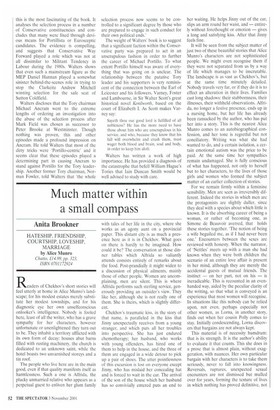Much matter within a small compass
Anita Brookner
HATESHIP, FRIENDSHIP, COURTSHIP, LOVESHIP, MARRIAGE by Alice Munro Chatto, £14.99, pp. 323, ISBN 0701172924 Readers of Chekhov's short stories will feel utterly at home in Alice Munro's landscape; for his modest estates merely substitute her modest townships, and for his diagnostic eye her own unselfconscious onlooker's intelligence. Nobody is fooled here, least of all the writer, who has a grave sympathy for her characters, however unfortunate or unenlightened they turn out to be. They inhabit a territory afflicted with its own form of decay: houses abut barns filled with rusting machinery, the church is dedicated to an unknown saint, while the hotel boasts two unvarnished storeys and a tin roof.
The people who live here are in the main good, even if that quality manifests itself as harmlessness. Such a one is Alfrida, the plucky unmarried relative who appears as a perpetual guest to enliven her glum family with tales of her life in the city, where she works as an agony aunt on a provincial paper. This distant city is as much a presence here as it is in Chekhov. What goes on there is hardly to be imagined. How could it be? The conversation at those dinner tables which Alfrida so valiantly attends consists entirely of remarks about the food. Post-pranclially it might widen to a discussion of physical ailments, mainly those of other people. Women are uncomplaining, men are silent. This is where Alfrida performs such sterling service, generously providing an outsider's view. They like her, although she is not really one of them. She is theirs, which is slightly different.
Chekhov's traumatic kiss, in the story of that name, is paralleled in the kiss that Jinny unexpectedly receives from a young stranger, and which puts all her troubles into perspective. She has just endured chemotherapy; her husband, who works with young offenders, has hired one of them to help in the house, and the three of them are engaged in a wide detour to pick up a pair of shoes. The utter pointlessness of this excursion is lost on everyone except Jinny, who has mislaid her concealing hat and is forced to wait in the car. The arrival of the son of the house which her husband has so convivially entered puts an end to


















































































 Previous page
Previous page